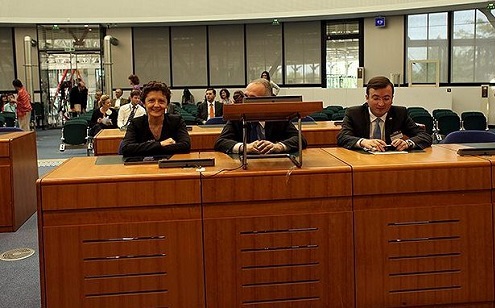Human Rights Court: Russia violated laws in mass deportation of Georgians

Russia’s 2006 policy of arresting, detaining and expelling large numbers of Georgian nationals from Russia was unlawful and violated the Euro Convention, said the Strasbourg-based European Court of Human Rights (ECHR) in its long-awaited verdict today.
After seven years, the Grand Chamber of the ECHR delivered its verdict about an inter-state complaint lodged by Georgia against Russia in connection to deportation of hundreds of Georgian nationals in late September 2006 and early 2007 following a Russia-Georgia spy row.
A Grand Chamber of 17 judges came to a majority verdict that ruled Russia had made numerous violations in the Euro Convention against Georgia. A delegation of Georgian officials was in Strasbourg to hear the outcome.
After the verdict was announced, the Court invited both parties to submit their observations on the matter and notify the Court of any compensation agreement they may reach within 12 months.
In its application, Tbilisi wanted Moscow to reimburse pecuniary and non-pecuniary damages for the alleged violation of the rights of hundreds of ethnic Georgians who were deported from Russia.
Today’s judgment, which was held in the Grand Chamber, is final. The ECHR found, by majority, there had been numerous instances of violations by Russia, which included:
- - A violation of Article 4 of Protocol No. 4 (prohibition of collective expulsion of aliens) of the ECHR;
- - A violation of Article 5 - 1 (right to liberty and security);
- - A violation of Article 5 - 4 (right to judicial review of detention);
- - A violation of Article 3 (prohibition of inhuman or degrading treatment);
- - Violations of Article 13 (right to an effective remedy) in conjunction with Article 5 - 1 and with Article 3; and a violation of Article 38 (obligation to furnish all necessary facilities for the effective conduct of an investigation).
The Court found no violation of the following articles:
- - No violation of Article 8 (right to respect for private and family life);
- - No violation of Article 1 of Protocol No. 7 (procedural safeguards relating to expulsion of aliens);
- - No violation of Articles 1 and 2 of Protocol No. 1 (protection of property and right to education).
When speaking about the verdict, a Court concluded that from October 2006, a "coordinated policy of arresting, detaining and expelling Georgian nationals, amounting to an administrative practice, had been implemented in Russia”.
"No effective and accessible remedies had been available to the Georgian nationals against their arrest,” the ECHR said.
"The conclusion reached by the Court regarding the implementation in the Russian Federation of a coordinated policy of arresting, detaining and expelling Georgian nationals from October 2006 also shows that the expulsions were collective in nature,” read the verdict.
ECHR also believed the finding did not call into question the right of the states to establish their own immigration policies.

Judgement was given by the Grand Chamber of 17 judges. Photo by Georgia's Ministry of Justice.
"It must be pointed out, however, that problems with managing migratory flows cannot justify a state’s having recourse to practices which are not compatible with its obligations under the Convention,” said the Court statement.
According to Georgian Government submissions, during that period more than 4,600 expulsion orders were issued by Russian authorities against Georgian nationals. Of this, more than 2,300 were detained and forcibly expelled and the remaining left the country by their own means.
A delegation of Georgian officials, led by Justice Minister Tea Tsulukiani, was in Strasbourg to hear the verdict. As a representative of all Georgian’s, Minister Tsulukiani said she believed the ECHR’s verdict was a win for all the Georgians who were unlawfully expelled from Russia.
"With [this] verdict, Russia has the international responsibility of knowing they violated of human rights,” Tsulukiani told journalists after the court hearing.
However, the Georgia’s Government Agent before the ECHR Levan Meskhoradze said the most important component of the Court’s decision was that "violations had been done not by individuals in an isolable manner but it was well planned expelling by Russia”.
During the court proceedings, 21 witnesses were called to give evidence from January 31 to February 4, 2011. Nine of these were proposed by Georgia, 10 by Russia and two were chosen by the court.
Meanwhile, Russia’s Ministry of Justice released a statement this afternoon in response to today’s ECHR verdict.
"The European Court of Human Rights did not consider the Georgian side’s claims of Russia’s inappropriate actions in regards to the convention prohibiting discrimination on any grounds, as identified by the European Court of Human Rights (ECHR) in violation of the deportation of Georgian citizens in 2006 relate only to conditions of stay of illegal migrants in detention centres,” Russia’s Ministry of Justice said.
It said the Court refused to consider the Georgian side’s claims of inappropriate action by Russia in regards to Article 14, which prohibited discrimination on any grounds, as well as Article 18 of the Convention, which set limits on the possible restrictions on the rights of citizens.
"The Court found no evidence of expulsion of Georgian citizens from Russia who were lawfully on [Russian] territory,” the statement said.
The Russian side said the ECHR identified violations that only concerned actions related to decision-making procedure of deportation, conditions in detention centers and illegal immigrants who had violated the statutory order of remaining in Russian territory.
Meanwhile, Georgia has a separate inter-state application against Russia that was filed to the ECHR in connection to the August war in 2008. This war-related case has been referred to the Grand Chamber and the verdict is pending.
 Tweet
Tweet  Share
Share